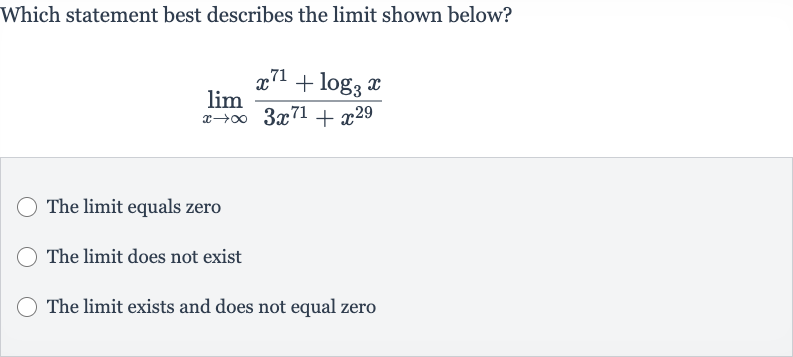Full solution
Q. Which statement best describes the limit shown below?The limit equals zeroThe limit does not existThe limit exists and does not equal zero
- Given Limit Analysis: We are given the limit: To find the limit as approaches infinity, we need to analyze the behavior of the numerator and the denominator separately.
- Highest Power Comparison: First, let's consider the highest power of in both the numerator and the denominator, which will dominate the behavior of the function as approaches infinity.In the numerator, the highest power of is .In the denominator, the highest power of is .
- Simplification by Division: We can divide both the numerator and the denominator by to simplify the expression.This gives us:
- Limit of Individual Terms: Simplifying the powers of x, we get:
- Final Simplification: As approaches infinity, approaches because the logarithmic function grows much slower than the power function .Similarly, also approaches because the exponent in the numerator is much smaller than the exponent in the denominator.
- Final Simplification: As approaches infinity, approaches because the logarithmic function grows much slower than the power function .Similarly, also approaches because the exponent in the numerator is much smaller than the exponent in the denominator.After taking the limits of the individual terms, we get:
- Final Simplification: As approaches infinity, approaches because the logarithmic function grows much slower than the power function .Similarly, also approaches because the exponent in the numerator is much smaller than the exponent in the denominator.After taking the limits of the individual terms, we get:Simplifying the expression, we find that the limit is:
- Final Simplification: As approaches infinity, approaches because the logarithmic function grows much slower than the power function . Similarly, also approaches because the exponent in the numerator is much smaller than the exponent in the denominator.After taking the limits of the individual terms, we get: Simplifying the expression, we find that the limit is: The limit of a constant is the constant itself, so the limit is:
More problems from Power rule
QuestionGet tutor help
QuestionGet tutor help
QuestionGet tutor help
QuestionGet tutor help
QuestionGet tutor help

